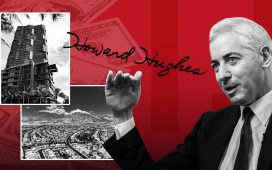One big deal to start: BHP has proposed a takeover of Anglo American, in a deal that would bring together two global mining giants and rank as one of the industry’s largest transactions in years.
And one interview to start: Europe is less hard-working, less ambitious, more regulated and more risk-averse than the US, according to the boss of Norway’s giant oil fund, with the gap between the two continents only getting wider.
Welcome to Due Diligence, your briefing on dealmaking, private equity and corporate finance. This article is an on-site version of the newsletter. Premium subscribers can sign up here to get the newsletter delivered every Tuesday to Friday. Standard subscribers can upgrade to Premium here, or explore all FT newsletters. Get in touch with us anytime: Due.Diligence@ft.com
Canary Wharf grapples with its (debt-laden) balance sheet
Transforming London’s derelict docklands into a booming financial district is surely an impressive feat. But now, Canary Wharf, the group behind that transformation, is facing another test: tackling its debt.
The real estate group, which is owned by Brookfield and the Qatar Investment Authority, has agreed a £553mn financing package as it stares down at debt deadlines, the FT’s Joshua Oliver reports.
Yet that might just be the beginning. It still faces a few more financing hurdles in the next 18 months. Becky Worthington, its chief financial officer, told the FT that it was looking into options for another £900mn of debt it aims to extend or refinance before the end of the year.
“We have been working on the debt side of the balance sheet,” she said.
Canary Wharf’s certainly not alone. Commercial real estate firms are being pummelled across the board, and banks could be among those left holding the bag. Wall Street firms could be at risk in the face of a $2tn “wall” of property debt coming due in the next three years.
Like so many others, it’s had a tough time keeping tenants — HSBC and Clifford Chance have both left its offices. But others, like Barclays and Morgan Stanley, have stuck around.
Regardless of Canary Wharf’s ability to keep some of its critical tenants, it still has a plentiful amount of debt, with the group holding £7.6bn of property and £4.2bn of net debt.
For Canary Wharf, at least, there’s a silver lining: Brookfield and the QIA have deep pockets and have expressed their continued support. Back in 2022, one of Canary Wharf’s primary entities received written confirmation from the two investors that they would provide financial support as part of the “going concern” analysis in its annual report.
We’ve said it before and we’ll say it again: it’s obviously a tough time for office real estate. For now, reviewing financing terms for the debt seems to be working. But how long can amending and extending last?
DD will be keeping an eye on whether the real estate giant’s investors will have to cut more cheques to get the group through the rough patch.
It’s Monaco or bust for this English council
DD readers may not expect a Monaco financier who dabbles in trading cryptocurrencies to move in the same circles as local councillors in an industrial town in northern England.
Yet, a hard-charging hedge fund boss based on the French Riviera has become enmeshed in the finances of a town 1,000 miles away, after Warrington Borough Council embarked on a debt-fuelled journey into speculative investing.
Our international readers may be wondering where a local council even gets the money to make high-stakes bets. The answer: leverage.
Warrington is just one of a swath of UK local councils that have borrowed from central government and then ploughed the proceeds into speculative ventures, in a risky bid to close the gap from swingeing budget cuts.
The town of 211,000 people, sandwiched between Liverpool and Manchester, is by one measure the most highly leveraged council in the country, according to the most recent government data, with borrowings of nearly £2bn. It has investments of about £1.5bn and is always on the hunt for a new moneymaking scheme.
Enter Lee Robinson. A former derivatives trader who cut his teeth at investment banks like Deutsche and hedge funds like Tudor, Robinson made a small fortune from selling a stake in his previous firm Trafalgar to Goldman Sachs months before Lehman Brothers collapsed in 2008.
The nicely timed trade allowed him to set up Altana Wealth in 2010, which he has said aims “to do interesting things with higher returns”. Over the years, Altana has claimed to devise trading strategies for assets ranging from bitcoin to Bordeaux.
Since Robinson met Warrington’s finance officers more than half a decade ago, the council has ploughed over £120mn in ventures linked to the Australian-born financier, who one council officer likened to star footballer Lionel Messi.
At least some of these deals have been more akin to own goals, however. Readers looking to go deeper should read the full investigation from DD’s Robert Smith and the FT’s Jennifer Williams and Clara Murray.
French container shipping magnate pivots to media
Rodolphe Saadé, the head of French container shipping giant CMA CGM, has long shunned the limelight at the helm of his family-owned company in Marseille.
But scooping up news channel BFM TV in March has propelled the Beirut-born executive into the ranks of media magnates in France, adding to his recent newspaper acquisitions. In a rare interview with the FT, the billionaire made it clear he has big ambitions — even if it means courting a bit of publicity he has long sought to avoid.
“I’m not going to hide behind my little finger,” Saadé said, comparing his family’s growing empire to some of France’s most emblematic industrialists: the Arnaults of luxury group LVMH fame or corporate raider Vincent Bolloré, who have also expanded into media.
Flush with cash after shipping rates soared during the Covid-19 pandemic, Saadé’s €35bn acquisition spree since then has mostly focused on a pivot into logistics, with media still more of an eye-catching sideshow.
But his rapid-fire deals since 2020 have also shown Saadé can take onlookers by surprise.
After buying planes to launch an air cargo venture in 2022 he also took a stake in Air France-KLM and formed a much-vaunted joint venture. Yet less than two years later, Saadé had no qualms abandoning the partnership with the government-backed carrier — ostensibly due to a problem with US route approvals, but also in a sign of his distaste for not having majority control, people who know him said.
Keep your eyes on DD — Rodolphe Saadé may not be done shaking up France’s media landscape.
Job moves
-
Goldman Sachs has hired Carsten Woehrn as a partner focused on mergers and acquisitions. He had been JPMorgan’s co-head of Emea M&A and co-head of its global strategic investor group M&A.
-
Blackstone has hired Dan Leiter as international head of the firm’s credit and insurance business. He previously worked for Morgan Stanley.
-
Haleon has hired Dawn Allen as chief financial officer beginning in October. She previously worked for Tate & Lyle and Mars.
-
Baker McKenzie has hired a group of 17 transactional and tax layers from Munger, Tolles & Olson, a firm with close ties to Berkshire Hathaway.
-
Pret A Manger has appointed Konrad Meyer, a partner at JAB, as chair.
Smart reads
Reservation hell There’s a reason why you’re having a nightmarish time getting that dinner reservation, The New Yorker reports.
Gone wrong Once you agree on a price, most acquisition deals are pretty straightforward. That wasn’t the case for a California grocery chain, the FT’s Behind the Money podcast explains.
Real estate folly A big real estate developer in China plotted out a development bigger than the land area of Monaco. There were plenty of red flags, The Wall Street Journal reveals.
News round-up
Employee non-compete ban challenged in court by US business groups (FT)
Russian court orders seizure of $440mn from JPMorgan (FT)
FDIC is approaching potential buyers of Republic First (Bloomberg)
UBS ‘seriously concerned’ by Swiss capital proposals, says chair Colm Kelleher (FT)
Boeing burns through $4bn in first quarter after door plug blowout (FT)
McKinsey under criminal investigation over opioid-related consulting (WSJ)
Due Diligence is written by Arash Massoudi, Ivan Levingston, William Louch and Robert Smith in London, James Fontanella-Khan, Ortenca Aliaj, Sujeet Indap, Eric Platt, Mark Vandevelde, Antoine Gara and Amelia Pollard in New York, Kaye Wiggins in Hong Kong, George Hammond and Tabby Kinder in San Francisco, and Javier Espinoza in Brussels. Please send feedback to due.diligence@ft.com












